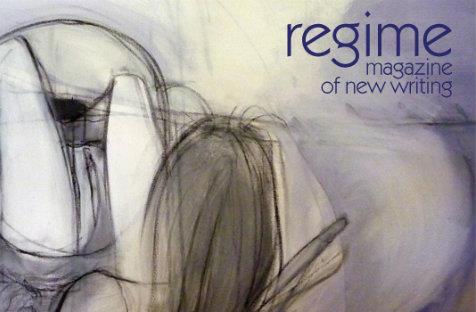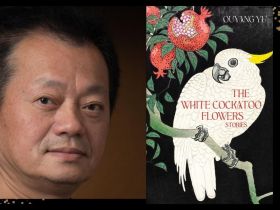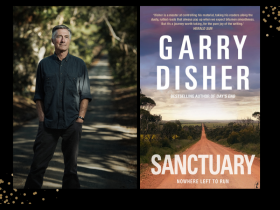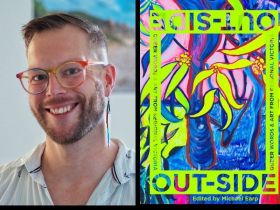Open the pages of Regime Magazine and you enter, as the publisher’s website claims, ‘the world’s most frivolous of serious literature magazines’. Frivolous it would seem – at least in the second issue’s case – an ascription owing to the editors’ cavalier attitude of running with their good instincts, and, secondly, to the diversity of style and subject allowed entrée in this literary magazine.
There is no trifling when it comes to the quality of the pieces of short story, poetry and performance within. These fiction morsels handpicked by Western Australian-based editors Peter Jeffery OAM, Nathan Hondros, Damon Lockwood and Chris Palazzolo, are sure to satiate any story hunger. Established masters and fresh talent, and Australian and international scribes are all on the magazine’s smorgasbord. The collection of writing in Regime 02 shows the richness of experience that ‘shorts’ have to offer in skilled hands: they can deliver quirky flings, windows of incredible pathos, and render the familiar new.
Geoff Page’s ‘Dear Mum and Dad/I hope you are well’ and ‘Seven Births are Seven Deaths’ softly interrogate the seemingly mundane customs of the child/parent interaction and how they fit into a generational and mortality portrait, respectively from each vantage point of the dichotomy. In ‘Blowie’, a tale of a fishing trip taken by young and old male relatives, Michelle Faye subtly explores the peer pressure that comes with instilling and encouraging tough blokedom, and the volatility and repression it can engender.
Numerous pieces engage with the fragile and shifting lines of romantic, sexual and in-between connections. Through multiple characters’ viewpoints, Erin Kelly, in ‘We, The Boys and the Girls’, delves into the many sides that can reveal themselves in the love game, which include the cruel, vulnerable, inane, cynical and sincere. Ian C. Smith’s ‘Two Figures on a Bed’ lays bare the hard edges and power of unspoken secrets and longings that dwell in the minds of a long-together and jaded couple. ‘The Meaning of a Moment’ by Elise Kinsella explores the primacy of intimate moments, their capacity to be both raw and tender – and the intense hunger, almost vampiric, that can motivate action. And Mark Konik’s ‘From a Great Height’, a stage piece, provides a comical dramatisation of a male over-thinking a female’s acceptance of a proposed date.
And then there are stories that deal with other kinds of interpersonal relationships. The protagonist in Ryan O’Neill’s ‘Martyr’ copes with the grief of his wife’s passing by expunging his home of all her religious paraphernalia, only to find himself under the insufferable eye of a zealous and peculiar teen who attends the school he teaches at. Sue Booker’s ‘When the Wind Blows’ portrays the odd connection that is struck between two female neighbours following a noise complaint, and ‘Listen to the Rhythm’, by Joanna Wolthuizen, explores coming to terms with a boyfriend’s elusive and strange-sounding roommate. Each of these stories displays their author’s writing prowess in the turns they take.
Many poems display skill in their structural form reflecting the subject being communicated. In Mikaela Castledine’s ‘The Sea is Theoretical’ stanzas ebb and flow as the sea’s sublime character and humanity’s perception of it pours onto the page, and Kathryn Hummel’s ‘Fish on Monroe’ traces a forever popular yet transient image alternating with long sensory evocative word strings and intermittent pauses. And there are pieces that exemplify the ability to delineate rich images with just a few words or lines such as ‘Drunken Lines at the Wrong Party’ by Rodney Nelson; ‘There is a Stillness’ by Jonathan Hadwen; and ‘M.B.’ and ‘Haiku’, both by Carly-Jay Metcalfe.
Dark humour resides in Jake Davies’s ‘On finding a dead girl in your bathtub’ that reads as an earnest etiquette guide to courting the said dead girl, with pointers such as ‘If she’s in a burial dress, complement the white lace cobwebs’. Charles Pitters’s ‘Literary Correspondence’ and Andy Jackson’s ‘FDA (Funeral Director’s Assistant)’ also take up the death trope with detached-yet-feeling poetic voice.
Harsh truths connected to politically ingrained identities are probed in Sofia Chapman’s ‘Villanelle: Detention Centre’ and Barnaby Smith’s ‘Talented Wives’. And Brennan O’Shea’s ‘Don’t Wait’ juxtaposes the differently led lives of two aging sisters to cast a sardonic eye on government provisions for the elderly. Fikret Pajalic’s ‘Oreo’ is a heart-wrenching tale of human cruelty towards animals. And Palazzolo’s ‘Woodies’ in an inventive tale of contagion that leaves a community perplexed.
Plenty more impressive fiction can be found in Regime 02. This issue is edited with pockets of thematically linked pieces but with enough variation to avoid any sense of sameness – allowing for one to comfortably read linearly or dip in a little more randomly. However Regime 02 is read, the muster of fiction it houses will no doubt intrigue and entertain.
Rating: 4 ½ stars out of 5
Regime Magazine Issue 2
Editors: Peter Jeffery OAM, Nathan Hondros, Damon Lockwood and Chris Palazzolo
Contributing Editor: Andrew Burke
Paperback, 208pp, RRP $25
ISBN: 9780987482105
Published by Regime Books





